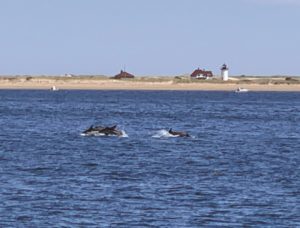Not much to report on the fishing front, as the water is still a bit too chilled to get things percolating. Striped bass continue their slow, deliberate trek to the north, but the word from the Canal and South Shore, where they first show up, is that it’s still pretty quiet.
It’s 40 degrees and breezy as I write this. The weather this week looks like it will be a bit cooler than last week, which could slow the bass migration down somewhat. We are hoping these fish do not spend the entire spring on the South Shore and in Boston Harbor, as they have done for the past two years. There were enormous schools of pogies (menhaden) there, which held the bass for most of the summer; what we got was peripheral fish instead of the main body.
A disturbing event took place in Texas this past week that is worth mentioning. A bottlenose dolphin stranded itself on Quintana Beach, just south of Galveston. There are a variety of reasons for dolphin strandings. Sometimes they’re just in the wrong place at the wrong time — here, in Wellfleet Harbor at low tide, for example. But it can also mean the dolphin is sick.
Beachgoers in Texas, noticing the dolphin struggling, approached it to bring it out to deeper water. First mistake. Then, as they got it into deeper water, they attempted to ride it. Which stressed the animal so much that it died. There are no words to accurately describe the ignorance displayed by these people in their endeavor to entertain themselves.

Our white-sided dolphins have a tighter social dynamic than the bottlenose dolphin that stranded in Texas, and our dolphins will often follow the lead of an alpha, so strandings here frequently involve more than one animal. For the untrained person who happens to come upon a stranding, what you need to do is contact IFAW’s marine mammal rescue hotline, 508-743-9548. Please, let the experts handle this delicate situation.
Humans should never initiate play with a dolphin in the water under any circumstances. Many years ago, I was a supply boat captain for offshore drilling rigs in the Gulf of Mexico, and we were often asked to tie up to the rig and wait for orders. On very hot days, while standing by, we would dive off our boat to go for a swim and cool off. Every now and then a few bottlenose dolphins would come over to check us out and play. They loved to charge at us and, at the last minute, swim underneath us. But that was their game, not ours. We let them be and did not interfere with their play. Usually, after a few minutes of this, they would swim off to do something else. These are extremely intelligent mammals who have reasons to do what they do. My guess is they are smarter than the humans who tried to ride them in Texas.
On the subject of play, we’ll be visited twice by the Ocean Navigator this week, once on Wednesday (though rough seas coming across the bay may mean they head straight from Newport to Boston) and again on Saturday.
Although it is marketed to cruise-goers as a ship that’s small enough to “easily navigate hidden ports,” this 299-foot 1,580-ton vessel with a crew of about 80 and carrying about 200 guests is too big to dock here. It will instead drop anchor outside the breakwater and be tendered.
The season has begun.



